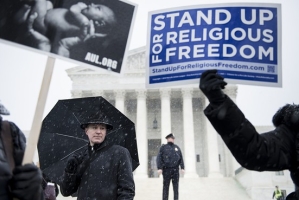
The Supreme Court heard from two family-owned businesses with deeply devout owners that seek to avoid offering birth control methods that conflict with their beliefs today. During the 90-minute oral argument this morning, the justices and lawyers got spirited at times over religious rights and federal mandates.
The cases Hobby Lobby Stores vs. Sebelius, and Conestoga Wood Specialties v. Sebelius have become the poster cases for religious freedom vs Obamacare, or the Affordable Care Act. Today their attorneys presented their cases to the Supreme Court and heard from the Justices.
According the the Washington Post, It was difficult to predict from the argument which side would prevail, but the government had the tougher task: to prove that the requirement did not violate a federal statute that gives great protection to the exercise of religion.
While demonstators for both sides of the issue braved cold weather outside the court, the debate inside got hot at times. This was the second time 'Obamacare' had been before the Supreme Court. Two years ago, in a 5-4 decision, it was found constitutional, but this time the decision facing the court was much more specific, and the challengers had more to lean on legally.
The question at hand: Can the government burden employers to provide all the coverage that it's HHS, or contraceptive mandate, demands?
Related: Hobby Lobby Supreme Court Case: Justices Divided After Hearing Oral Argument (Full Transcript)
According to USA Today, the court's chamber was packed for the debate.
The contraceptive requirement has been the subject of more than 100 lawsuits across the country, including 78 that are still pending. More than 80 outside groups submitted briefs to the Supreme Court in the Hobby Lobby case alone.
The justices were predictably divided in their reaction to the sides, according the to the USA Today article, but did not seem to want to force for-profit corporations to offer health plans that include birth control methods they claim cause abortions.
Solicitor General Donald B. Verrilli Jr. clearly sought to avoid the inconclusive medical debate over intrauterine devices and morning-after pills, and tried to say that because nearly 2 million women use some types of the controversional type of contraception, then they must not view it as abortive.
Paul Clement. a Washington Attorney who represents the two companies involved, argued that the issue of contraception is "so fraught with religious controversy" that an exception should be made for the family-owned companies, as it was for churches and religious non-profits, such as charities and universities.
"Everything would be piecemeal, and nothing would be uniform," Justice Elen Kagan challenged, upon hearing this position from Clement.
The court's liberal judges also questioned whether for-profit corporations should be able to claim religious views; but the conservative Justices pointed out that the federal government had far less burdensome ways of providing women contraceptive coverage, and took exception to the argument that corporations cannot have religious objections.
"There's not a single case that says a for-profit enterprise cannot make a religious claim," Justice Antonin Scalia said.
"Isn't that what we're talking about?" Chief Justice John Roberts demanded of the government's lawyer, Solicitor General Donald Verrilli.
The central focus of the companies position was the Religious Freedom Restoration Act, passed by Congress in 1993. It was designed to give those with religious beliefs a way of fighting back against laws they consider a violation of their sacred beliefs.
If the companies fail to convince the Supreme Court to overturn the mandate, they face fines of $100 per day per employee. That could cost Hobby Lobby alone over $450 million a year in fines. It would be much less expensive to drop health coverage, Justice Kagan noted.
Hobby Lobby argues that having to drop coverage would put them at a competitive disadvantage, and potentially drive them out of business.
After the arguments, some from Hobby Lobby felt like maybe the advantage in the courtroom was theirs.
"We believe that Americans don't lose their religious freedoms when they open a family business," Barbara Green, one of Hobby Lobby's owners, told reporters. "We were encouraged by today's arguments."







